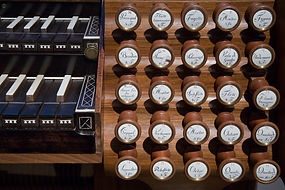
The Pipe Organ


A pipe organ is a keyboard instrument. The organist needs to use both hands and feet to play the organ! The hands play on the keyboards which are called "manuals". The feet play the pedals that also look like a keyboard. In a pipe organ there are no strings, the notes are made by blowing air through pipes. Organs are used in churches because they need a lot of space and because they are able produce a lot of sound - even without electricity.
Every organ has pipes, something to blow the air and a way to control which pipes are played. The pipes are made of metal or wood. They are lined up in rows in the "organ case" which can be as big as a room. The air to make the sound is stored in a box called a "wind chest".
The wind chest has to be kept full either by an electric motor and
fan or by pumping "bellows". That's how the it was done in Bach's
time - and it was HARD work! Look at how big the bellows are!

The way in which the organist controls which pipes are played is by using the "stops".
Movies


Stops look like knobs and can be pulled out or pushed in. When a stop is pulled out it turns on a set of pipes - the pipes can be loud or soft and sound like different instruments.
Playing the organ is complicated! Here are some videos that will show you more about the organ.
Introducing the Organ
The organist from the Toronto Symphony Orchestra talks about the Organ.
How to Build a Pipe Organ
This Discovery Channel video tells you how to build an organ - but be warned, you'll need 20,000 hours!
How an Organ Makes Music
Duke University Organist, John Santoianni demonstrates how the stops in an organ work.
How a Pipe Organ Works
This animation shows the inside of the organ and how it works